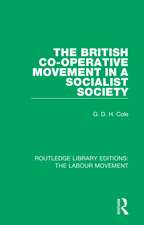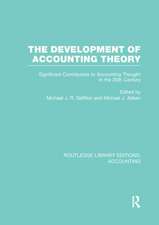Managing Democratic Organizations II: Volume II: Routledge Revivals
Editat de Frank Helleren Limba Engleză Paperback – 4 mar 2020
| Toate formatele și edițiile | Preț | Express |
|---|---|---|
| Paperback (1) | 194.17 lei 6-8 săpt. | |
| Taylor & Francis – 4 mar 2020 | 194.17 lei 6-8 săpt. | |
| Hardback (1) | 508.29 lei 6-8 săpt. | |
| Taylor & Francis – 5 iun 2019 | 508.29 lei 6-8 săpt. |
Din seria Routledge Revivals
- 9%
 Preț: 801.71 lei
Preț: 801.71 lei - 8%
 Preț: 432.64 lei
Preț: 432.64 lei -
 Preț: 153.83 lei
Preț: 153.83 lei -
 Preț: 230.80 lei
Preț: 230.80 lei -
 Preț: 309.79 lei
Preț: 309.79 lei -
 Preț: 258.73 lei
Preț: 258.73 lei - 9%
 Preț: 764.35 lei
Preț: 764.35 lei - 9%
 Preț: 903.42 lei
Preț: 903.42 lei -
 Preț: 311.18 lei
Preț: 311.18 lei -
 Preț: 357.45 lei
Preț: 357.45 lei - 9%
 Preț: 606.36 lei
Preț: 606.36 lei -
 Preț: 317.54 lei
Preț: 317.54 lei - 9%
 Preț: 764.30 lei
Preț: 764.30 lei -
 Preț: 257.01 lei
Preț: 257.01 lei -
 Preț: 238.40 lei
Preț: 238.40 lei -
 Preț: 259.48 lei
Preț: 259.48 lei - 9%
 Preț: 903.81 lei
Preț: 903.81 lei -
 Preț: 326.26 lei
Preț: 326.26 lei -
 Preț: 258.67 lei
Preț: 258.67 lei -
 Preț: 294.98 lei
Preț: 294.98 lei -
 Preț: 308.89 lei
Preț: 308.89 lei -
 Preț: 199.86 lei
Preț: 199.86 lei -
 Preț: 347.50 lei
Preț: 347.50 lei -
 Preț: 302.59 lei
Preț: 302.59 lei -
 Preț: 389.40 lei
Preț: 389.40 lei -
 Preț: 257.01 lei
Preț: 257.01 lei -
 Preț: 343.22 lei
Preț: 343.22 lei - 9%
 Preț: 640.91 lei
Preț: 640.91 lei - 9%
 Preț: 619.49 lei
Preț: 619.49 lei -
 Preț: 228.88 lei
Preț: 228.88 lei -
 Preț: 265.16 lei
Preț: 265.16 lei -
 Preț: 245.11 lei
Preț: 245.11 lei -
 Preț: 258.54 lei
Preț: 258.54 lei -
 Preț: 258.73 lei
Preț: 258.73 lei -
 Preț: 368.93 lei
Preț: 368.93 lei -
 Preț: 246.38 lei
Preț: 246.38 lei - 9%
 Preț: 832.08 lei
Preț: 832.08 lei -
 Preț: 258.67 lei
Preț: 258.67 lei -
 Preț: 286.99 lei
Preț: 286.99 lei - 18%
 Preț: 695.86 lei
Preț: 695.86 lei - 9%
 Preț: 934.96 lei
Preț: 934.96 lei - 5%
 Preț: 243.38 lei
Preț: 243.38 lei -
 Preț: 274.69 lei
Preț: 274.69 lei -
 Preț: 200.67 lei
Preț: 200.67 lei - 9%
 Preț: 638.62 lei
Preț: 638.62 lei -
 Preț: 259.69 lei
Preț: 259.69 lei - 9%
 Preț: 1038.47 lei
Preț: 1038.47 lei -
 Preț: 389.46 lei
Preț: 389.46 lei -
 Preț: 302.14 lei
Preț: 302.14 lei -
 Preț: 302.27 lei
Preț: 302.27 lei
Preț: 194.17 lei
Preț vechi: 228.29 lei
-15% Nou
Puncte Express: 291
Preț estimativ în valută:
37.16€ • 39.73$ • 30.98£
37.16€ • 39.73$ • 30.98£
Carte tipărită la comandă
Livrare economică 17 aprilie-01 mai
Preluare comenzi: 021 569.72.76
Specificații
ISBN-13: 9781138361737
ISBN-10: 1138361739
Pagini: 498
Dimensiuni: 170 x 244 x 32 mm
Greutate: 0.93 kg
Ediția:1
Editura: Taylor & Francis
Colecția Routledge
Seria Routledge Revivals
Locul publicării:Oxford, United Kingdom
ISBN-10: 1138361739
Pagini: 498
Dimensiuni: 170 x 244 x 32 mm
Greutate: 0.93 kg
Ediția:1
Editura: Taylor & Francis
Colecția Routledge
Seria Routledge Revivals
Locul publicării:Oxford, United Kingdom
Cuprins
Part 3. Industrial Democracy in Europe (IDE). 16. Bernhard Wilpert (1981), ‘Inside Story: Inside IDE’, Organization Studies, 2, pp. 181-4. 17. Bernhard Wilpert (1984), ‘Participation in Organizations: Evidence from International Comparative Research’, International Social Science Journal, UNESCO, XXXVI, pp. 355-66. 18. IDE – International Research Group (1976), ‘Industrial Democracy in Europe (IDE): An International Comparative Study’, Social Science Information, 15, pp. 177-203. 19. IDE – Industrial Democracy in Europe International Research Group (1979), ‘Participation: Formal Rules, Influence, and Involvement’, Industrial Relations, 18, pp. 273-94. 20. IDE International Research Group (1981), ‘Industrial Democracy in Europe: Differences and Similarities Across Countries and Hierarchies’, Organization Studies, 2, pp. 113-29. 21. Pieter J.D. Drenth and Bernhard Wilpert (1990), ‘Industrial Democracy in Europe: Cross National Comparisons’, in P.J.D. Drenth, J.A. Sergent and P.J. Takens (eds), European Perspectives in Psychology, 3, pp.115-31. 22. Bengt Stymne (1986), ‘Industrial Democracy and the Worker’, International Review of Applied Psychology, 25, pp. 101-19. 23. Oiva Laaksonen (1984), ‘Participation Down and Up the Line: Comparative Industrial Democracy Trends in China and Europe’, International Social Science Journal, UNESCO, XXXVI, pp. 299-318. 24. Frank A. Heller, Malcolm Wilders, Peter Abell and Malcolm Warner (1979) ‘What do the British Want from Participation and Industrial Democracy?’, published: Anglo-German Foundation for the Study of Industrial Society, pp. 1-5, 8-21, 24-54, 99-103. 25. IDE – International Research (1992), ‘Industrial Democracy in Europe Revisited: Summary and Conclusions’, Social Science Information, 31, pp. 773-85. 26. Bernhard Wilpert (1989), ‘Industrial Democracy – A Challenge to Leadership in European Work Organizations’, in B.J. Fallon, H.P. Pfister, J. Brebner (eds), Advances in Industrial Organizational Psychology, North Holland: Elsevier Science Publishers BV, pp. 125-31. Part 4. Decisions in Organizations (DIO). 27. Frank A. Heller, Pieter J.D. Drenth, Paul Koopman and Veljko Rus (1977), ‘A Longitudinal Study in Participative Decision-Making’, Human Relations, 30, pp. 567-87. 28. Decisions in Organizations (1979), ‘Participative Decision Making: A Comparative Study’, Industrial Relations, 18, pp. 295-309. 29. Paul L. Koopman, Pieter, J.D. Drenth, Frank A. Heller and Veljko Rus (1993), ‘Participation in Complex Organizational Decisions: A Comparative Study of the United Kingdom, The Netherlands, and Yugoslavia’, in William M. Lafferty and Eliezer Rosenstein (eds), International Handbook of Participation in Organizations, 3, Oxford: Oxford University Press, pp. 113-33. 30. Paul L. Koopman, Pieter J.D. Drenth, Frans B.M. Bus, Agaath J. Kruyswijk and André F.M. Wierdsma (1981), ‘Content, Process, and Effects of Participative Decision Making on the Shop Floor: Three Cases in the Netherlands’, Human Relations, 34, pp. 657-76. 31. DIO International Research Team (1983), ‘A Contingency Model of Participative Decision Making: An Analysis of 56 Decisions in Three Duth Organizations’, Journal of Occupational Psychology, 56, pp. 1-18. 32. Zhong-Ming Wang and Frank A. Heller (1993), ‘Patterns of Power Distribution in Managerial Decision Making in Chinese and British Industrial Organizations’, The International Journal of Human Resource Management, 4, pp. 113-28. 33. Frank Heller (1997), ‘The Time Dimension in Organizational Research’, in Timothy Clark (ed.), Advancement in Organizational Behaviour: Essays in Honour of Derek S. Pugh, Aldershot: Ashgate, pp. 297-312. 34. Alan Brown and Frank Heller (1981), ‘Usefulness of Group Feedback Analysis as a Research Method: Its Application to a Questionnaire Study’, Human Relations, 34, pp. 141-56. 35. Frank Heller and Alan Brown (1995), ‘Group Feedback Analysis Applied to Longitudinal Monitoring of the Decision Making Process’, Human Relations, 48, pp. 815-35. Part 5. Valediction and the Future. 36. Thoralf U. Qvale (1996), ‘Local Development and Institutional Change: Experience from a "Fifth Generation" National Programme for the Democratization of Working Life’, in Pieter J.D. Drenth, Paul L. Koopman and Bernhard Wilpert (eds), Organizational Decision-Making Under Different Economic and Political Conditions, Proceedings of a Symposium at the Roya Netherlands Academy of Arts and Sciences, 1-3 June 1994, Amsterdam: North Holland, pp. 29-41. 37. Frank Heller (1998), ‘Influence at Work: A 25-Year Program of Research’, Human Relations, 51, pp. 1425-56. 38. Velko Rus (1984), ‘The Future of Industrial Democracy’, International Social Science Journal, XXXVI, UNESCO Special Issue: Industrial Democracy, pp. 233-54.
Descriere
First published in 2000, this volume, along with its counterpart, consist of contributions to the history of management and management thought which ask and assess how important managing democratic organizations is today, and how important it will prove to be moving forward, presenting both optimistic and pessimistic interpretations.














